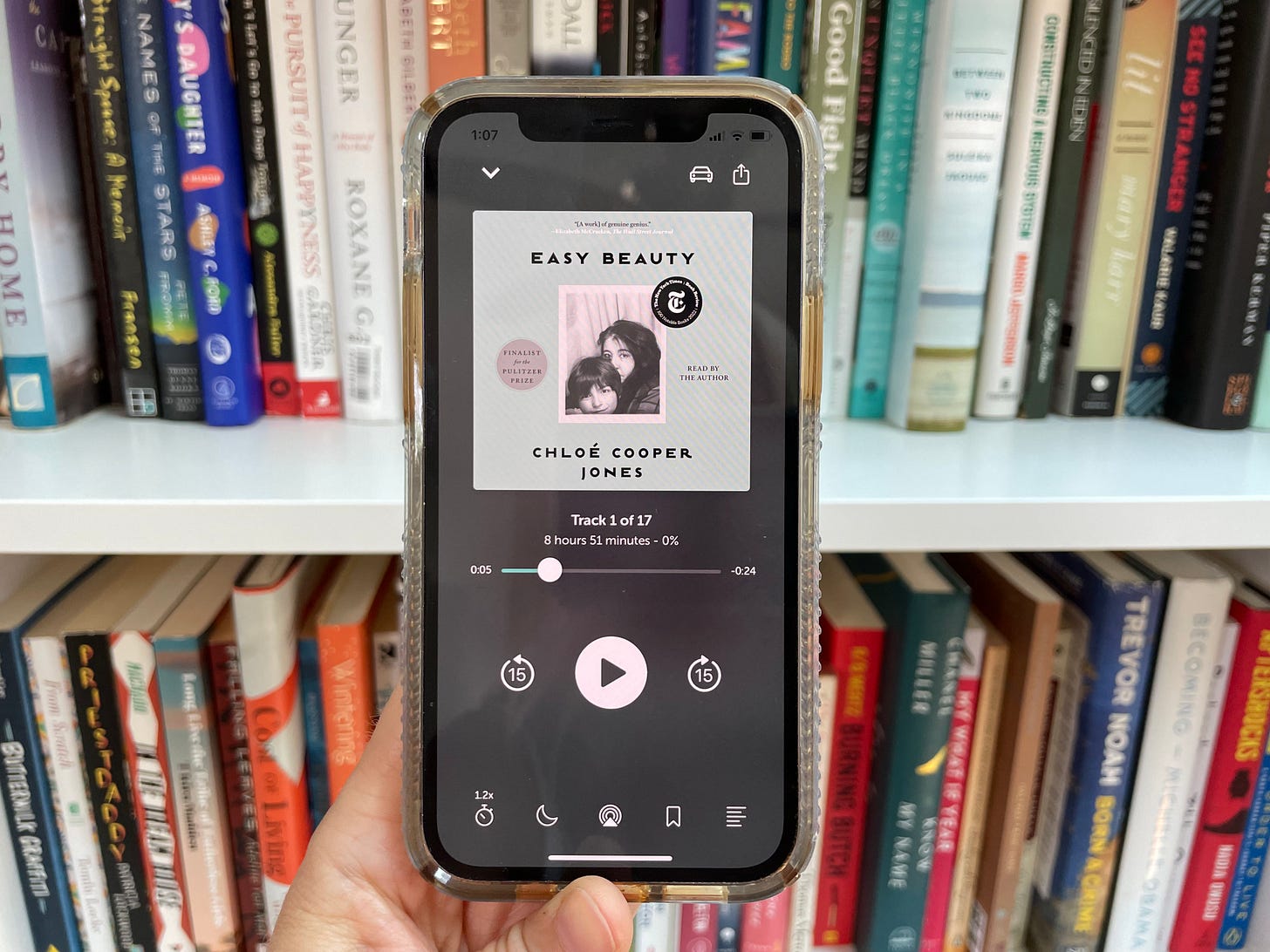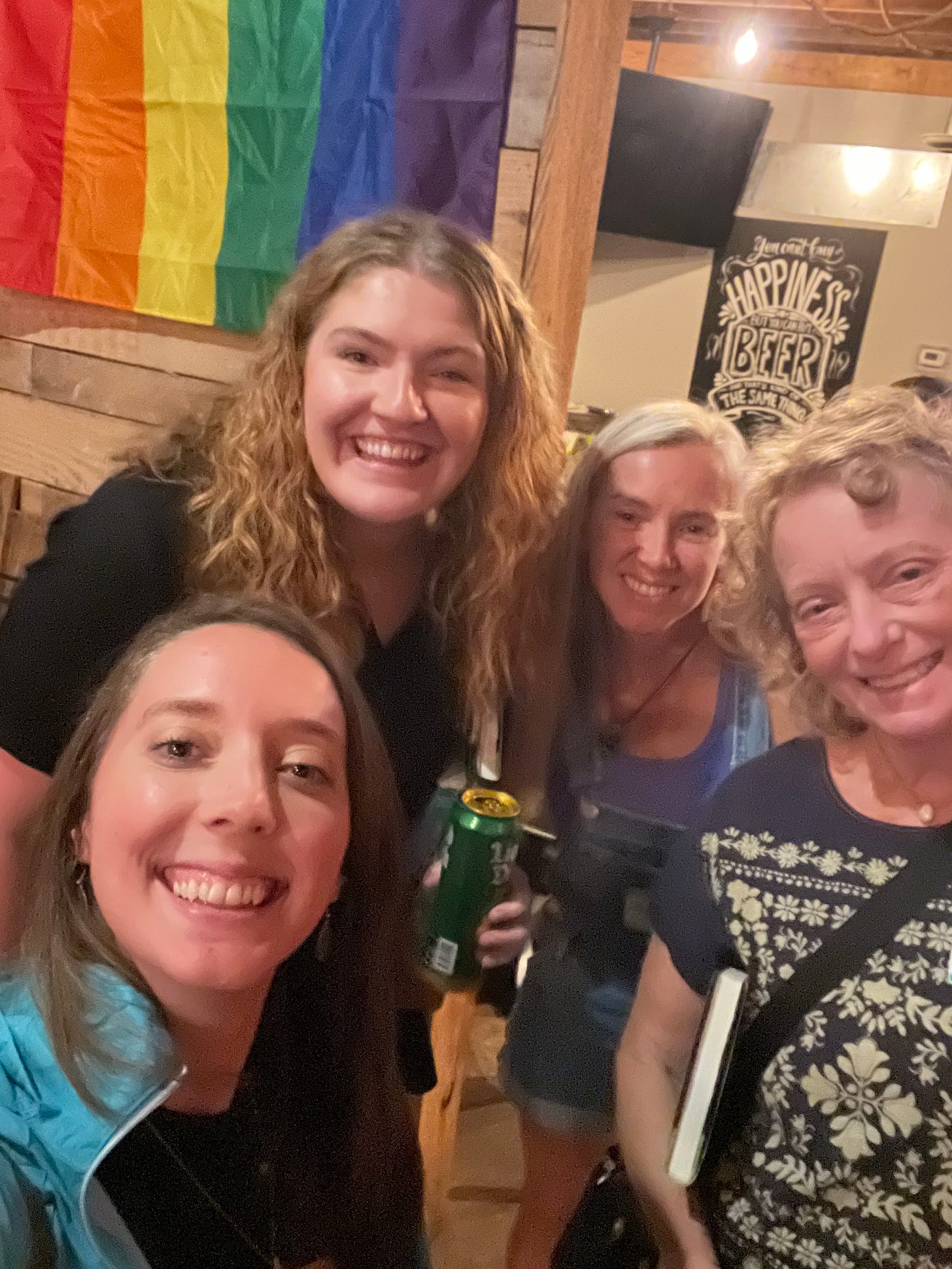Easy Beauty, by Chloé Cooper Jones
Plus a year of reading 70+ memoirs and finding connection outside social media
Memoirs with Melissa shares bimonthly reviews intended to expose readers to diverse authors and life experiences. To see more of what I’m reading, browse my reading activity on The Story Graph.
August marks one year of writing about memoirs on Substack. After 73 memoirs read and 47 reviewed, my view of the world and humanity has expanded. But there remains a hole in the material I’ve been covering. While I’ve reviewed some excellent memoirs by authors who are part of the disability community (for example, Fairest by Meredith Talusan), I have yet to dig into a memoir with the primary intention of expanding my awareness of the experience of disability.
Enter Easy Beauty, by Chloé Cooper Jones. This memoir landed in my TBR pile after making several best-of lists in 2022 and becoming a Finalist for the 2023 Pulitzer Prize in Memoir/Autobiography. Read in the steady, personable voice of the author herself, Easy Beauty took no effort on my part to become engrossed in. This book has it all: forward narrative thrust, thoughtful emotional pacing, intellectual fodder, and enviable prose. It’s the type of writing I’ve developed a taste for and haven’t yet figured out how to create on my own.
This book has it all: forward narrative thrust, thoughtful emotional pacing, intellectual fodder, and enviable prose.
While Jones was born with a disability that affects both her height and how she moves through the world, her narrative makes clear it’s one part of her full identity. But in an ableist society, most people don’t choose to see her disability as an integrated part of who she is.
Her story is fraught with ill-intentioned and even well-meaning but obtuse statements and actions from others. She opens with a riveting scene in a bar, where two male colleagues have the audacity to debate whether or not her life has merit. From there, she moves on to her solo travel adventures, where strangers want to know what makes her body different.
This need-to-know drive from strangers reminded me of the way so many people react to encountering a person who doesn’t fit their idea of gender. People would rather know how to classify a body than afford someone the courtesy to exist outside their known labels.
People would rather know how to classify a body than afford someone the courtesy to exist outside their known labels.
Throughout the book, Jones tends toward the philosophical, but her writing is grounded in rich, sensory prose: the feel of her child’s sweaty palm in hers, a sharp pain shooting up one hip, and the heady smell of food in Cambodia. One of my favorite scenes is her reluctant attendance of a Beyoncé concert in Milan, a surreal experience that challenges her own preconceptions of beauty. If you’ve ever dared to think Beyoncé personifies simple, uncomplicated beauty, this story will make you reconsider.
Jones’ descriptions and thought experiments widened my lens on the world and exposed my own ignorances to myself. At the same time, she did what I’ve come to realize is a hallmark of good memoir. She relentlessly interrogates her own thought limitations.
Beyond the pieces I’m choosing to highlight in this review, Jones wrestles with her midwestern childhood, the undesirable side of the tendencies she’s inherited from her father, her unexpected thrust into parenthood, and her self-protective habit of partitioning herself off from the world. By exploring and accepting the mundane beauty of being alive, and of loving and being loved, she somehow transcends other people’s ignorance and develops a more compassionate view of humanity and of herself.
On Finding Connection Outside Social Media
If you follow me anywhere outside Substack, you may have noticed my online habits have been shifting. Perfection is impossible, but I’m constantly striving to align my actions with my values. Here’s what I’ve been reading and a quick look at four habits I’ve changed as a result.
1. Digital Minimalism and Jaron Lanier have me re-evaluating my participation in social media.
Digital Minimalism by Cal Newport is the book that first led me to reduce the amount of time I spend on social media. Then came Jaron Lanier’s Ten Arguments for Deleting Your Social Media Accounts Right Now. Together, these books were like taking the red pill in The Matrix and waking up to the hidden workings of a system deeply embedded in our daily lives. As much as I love seeing my friends’ updates, it’s hard not to feel like a cross between a vulnerable blob of data and a human billboard every time I sign in to my various accounts. I’m still around, but not as much.
2. LitHub’s interview with Robin Sloan convinced me to quit Twitter/X.
If I’m going to experiment with leaving social media, Twitter (now X) seems like a logical place to start. In his recent interview with LitHub, Robin Sloan, author of Mr. Penumbra’s 24 Hour Bookstore and former Twitter employee convinced me I don’t need Twitter to have a writing career. So I’m no longer posting on that platform. I also took Sloan’s lead and left a simple bio visible so people can find me elsewhere.
3. Sara Levy and Jane Friedman inspired me to pull back from Goodreads and lean into The Story Graph.
Sara Levy at Drinking Games quit Goodreads and pointed me to the New York Times article on review bombing that’s leading others to do the same. Jane Friedman also alerted me to the problem of poor-quality, AI-generated books being released under her name that end up being attributed to her on both Amazon and Goodreads. This is a nightmare for her and many other authors. If you’ll notice, the “what I’m reading” link at the beginning of my reviews now connects to The Story Graph rather than Goodreads, and so does each link to books mentioned in my reviews. The Story Graph is a Black woman-owned alternative, inspired by founder Nadia Odunayo’s frustrations with Goodreads. The only reason I’m maintaining a presence on Goodreads is because I want authors to benefit from the positive reviews I post.
4. Pleasure Activism helped me rediscover the joy of in-person community.
Pleasure Activism by Adrienne Marie Brown has long been in my TBR pile. When I saw Femme Fire Books selected it as their July book club read, I bought the book, read it in a week, and landed in the backroom of Alewife to discuss with four tables full of engaged, open-minded readers. I also unexpectedly ran into a kindred friend there whom I haven’t seen in ages. What better confirmation of actions and values aligning?
All my reviews are public. I welcome and value every free subscriber. Paid subscriptions are an extra way to support my work and help this project succeed. Thank you!







A thought-provoking read, thank you. Something I've experienced with social media is the major mind-shift that occurred when I decided to publish independently. Long before I became a writer, I found social media a very natural way to engage with the world, but when I was querying the traditional publishing industry, the pressure to build a platform judged primarily on quantity made it a far from enjoyable experience. The moment I decided to strike out on my own, I was able to return to authentic connections with those I met online, instead of always chasing after numbers.
That’s an important point! I’ve made wonderful, authentic connections via social media with other writers. This is something I’m still noodling on.